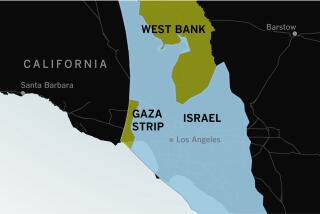Anglicans May Target Firms Seen as Anti-Palestinian
The worldwide association of Anglican churches will consider a controversial report Friday that calls for companies in its investment portfolios to drop any business activity supporting the Israeli occupation of Palestinian territories.
The Anglican Consultative Council, the association’s policymaking body, will discuss at its 10-day meeting underway in Nottingham, England, whether to recommend the proposal to the Anglican Communion. The communion comprises 77 million members belonging to the Church of England, the U.S. Episcopal Church and three dozen related churches.
The association’s decision will be closely watched by those with a stake in the Middle East peace process and could affect Anglican-Jewish relations. It was not immediately clear how much money might be involved.
Consideration of the report comes a month after Britain’s largest union of university teachers ended a monthlong boycott of two Israeli universities accused of pursuing anti-Palestinian policies.
Also last month, the Church of England Ethical Investment Advisory Group, which guides the church on its nearly $12 billion in investments, rejected calls to sell its stock in Caterpillar Inc. The Illinois-based company’s bulldozers have been used by the Israeli army to demolish houses of suspected Palestinian militants and their relatives.
The current report asks member churches to challenge companies in their portfolio to divest “from any part of their business that supports the occupation or violence against innocent Israelis,” such as suicide bombings.
Jewish and other community leaders have criticized the proposal -- which, despite its reference to suicide bombings, focuses mainly on Israeli actions -- as unhelpful and an unfair vilification of Israel.
“Divestment campaigns, boycotts and efforts to single out Israel alone among all countries of the world for punitive measures will have a catastrophic effect on those on all sides who seek peace,” Jon Benjamin, chief executive of the Board of Deputies of British Jews, wrote in a letter to the investment advisory group.
“Who is to judge which corporate investments support ‘the occupation’? Who is to judge who are ‘innocent Israelis’?” Benjamin asked in an interview with the Los Angeles Times.
George Carey, former archbishop of Canterbury -- the leader of the Church of England -- also denounced the report.
“Israelis are already traumatized and feel that the world is against them,” Carey said, quoted in the Times of London.
“This proposal, if it is agreed, would be another knife in the back. Christians who owe so much to the Hebrew scriptures and to Israel itself should not be among those who attack Israel in such a way.”
The Simon Wiesenthal Center in Los Angeles applauded Carey’s statements.
Representatives to the Anglican Peace and Justice Network wrote the 35-page report after a weeklong trip to Jerusalem in September, during which Riah Hanna abu Assal, a Palestinian Christian and bishop of Jerusalem, played host to the group.
Brian Grieves, the network’s U.S. representative, said that after the group had met with Palestinians and Israeli peace activists, it concluded that “Israel has systematically and deliberately oppressed and dehumanized the people of Palestine,” and “it is the occupation in its many facets that foments the violence and fuels the conflict.”
Grieves said the goal of the proposed economic sanctions was not to withdraw investment funds from companies but to persuade them to avoid activities that help Israel control Palestinian territories.
“If we have a company in our portfolio, for example, that’s selling hamburgers in a fast-food chain in a settlement somewhere in the West Bank or East Jerusalem, if we divested of our stock in that company, that company would still be selling hamburgers, and we wouldn’t have achieved anything,” Grieves said. “What we want to see is that company change its business practice.”
Afif Safieh, Palestinian general delegate to Britain, praised the report as “a way of sending a political message to the Israeli government, but mainly to the Israeli public opinion, that some soul-searching would be well advised.”
But Edward Kessler, director of the Cambridge Center for the Study of Jewish-Christian Relations, questioned the report’s timing “at a moment when there’s been a sign of progress” in the region, given a new Palestinian leadership and Israel’s commitment to withdraw settlers and troops from the Gaza Strip.
Kessler said the report takes the wrong approach: “It is important for the church to offer positive encouragement for people trying to resolve this conflict, rather than to be seen as taking sides.”
The Anglican report follows U.S. church calls for divestment. Last year, the U.S. Presbyterian Church adopted a policy of “phased, selective divestment” from companies contributing to the Israeli occupation.
Other U.S. mainline Protestant denominations, including the United Methodist Church, the United Church of Christ and the Evangelical Lutheran Church in America, have considered taking similar steps.
The Socially Responsible Investment Committee of the U.S. Episcopal Church began a yearlong inquiry into the matter in September.
The Church of England gave “preliminary consideration” to the current report but delayed action until the Consultative Council examines it Friday, church spokesman Lou Henderson said.
If the council endorses the report, he said, “certainly the Church of England would then start to give very serious consideration to the issues raised.”
More to Read
Start your day right
Sign up for Essential California for news, features and recommendations from the L.A. Times and beyond in your inbox six days a week.
You may occasionally receive promotional content from the Los Angeles Times.






